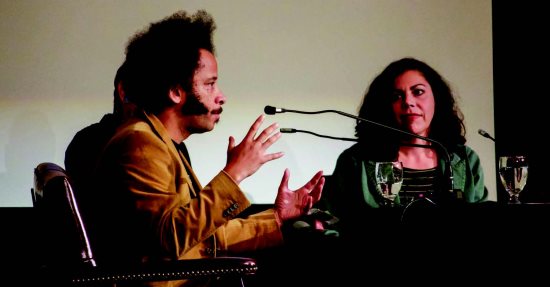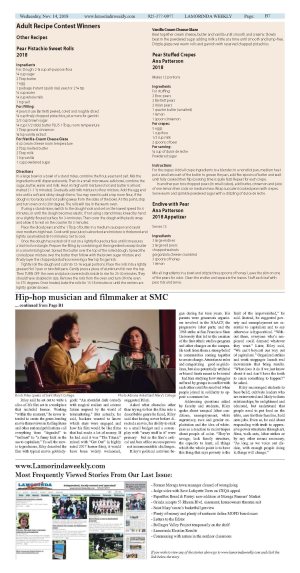| | Published November 14th, 2018
| Hip-hop musician and filmmaker discusses his film, as well as issues of race and activism at SMC
| | | By Lou Fancher |  | | Boots Riley speaks at Saint Mary's College. Photo Adriana Avila/Saint Mary's College |
When people in the Bay Area think of Saint Mary's College, a small private catholic college tucked away in the quiet cul de sac town of Moraga, funk-punk hip-hop musician and politically engaged independent filmmaker Boots Riley isn't the first person who springs to mind.
 If outsiders know of the college at all, it's likely to be because of the strong national profile of the Gaels men's basketball team. Dig a layer deeper, perhaps there's familiarity with SMC's innovative Jan Term that has students in Moraga and all over the world stepping outside of their traditional course of study to learn among other topics about dog behavior, good deeds, horror films, social justice playlists, or to travel to Australia to study endangered species or to Puerto Rico to provide hurricane rebuilding assistance. A near-scholar or historian of the school might know of its five-point Lasallian mission related to social justice, community, faith, respect for the poor and education.
If outsiders know of the college at all, it's likely to be because of the strong national profile of the Gaels men's basketball team. Dig a layer deeper, perhaps there's familiarity with SMC's innovative Jan Term that has students in Moraga and all over the world stepping outside of their traditional course of study to learn among other topics about dog behavior, good deeds, horror films, social justice playlists, or to travel to Australia to study endangered species or to Puerto Rico to provide hurricane rebuilding assistance. A near-scholar or historian of the school might know of its five-point Lasallian mission related to social justice, community, faith, respect for the poor and education.
 Importantly, it is on this political, ethical, often radically countercultural foundation of kindness and consideration for all people that an organic connection was forged between SMC and Riley. The Oakland-based artist appeared Nov. 7 on the campus in an interactive discussion presented by the Ethnic Studies Department. Riley's music and recent film, "Sorry to Bother You," touches on themes that prove cultural expression is political expression, according to Michael Viola, an assistant professor in the Justice, Community and Leadership program. "How can we use film to critique power and society? It's important in this moment of division, of folks not interested in dialogue, to have Boots here to talk to us," said Viola.
Importantly, it is on this political, ethical, often radically countercultural foundation of kindness and consideration for all people that an organic connection was forged between SMC and Riley. The Oakland-based artist appeared Nov. 7 on the campus in an interactive discussion presented by the Ethnic Studies Department. Riley's music and recent film, "Sorry to Bother You," touches on themes that prove cultural expression is political expression, according to Michael Viola, an assistant professor in the Justice, Community and Leadership program. "How can we use film to critique power and society? It's important in this moment of division, of folks not interested in dialogue, to have Boots here to talk to us," said Viola.
 Introducing Riley to the audience of approximately 200 people, Viola centered an account of the filmmaker's accomplishments within the context of the Black Radical Cultural movement. Like a hymn, spiritual, or folk song, he suggested, Riley's film includes pain, beauty, protest, articulated hope and revolution - all grounded in ethical, collective calls to action.
Introducing Riley to the audience of approximately 200 people, Viola centered an account of the filmmaker's accomplishments within the context of the Black Radical Cultural movement. Like a hymn, spiritual, or folk song, he suggested, Riley's film includes pain, beauty, protest, articulated hope and revolution - all grounded in ethical, collective calls to action.
 The film that has received considerable critical attention features Cassius Green, a character of color whose ability to master a "white voice" shoots him to the top of a telemarketing company's capitalistic stack - whereupon everything goes haywire, to say the least.
The film that has received considerable critical attention features Cassius Green, a character of color whose ability to master a "white voice" shoots him to the top of a telemarketing company's capitalistic stack - whereupon everything goes haywire, to say the least.
 Riley said he set out to write a slice-of-life film set in a workplace that included humor. Working "within the moment," he never intended to create the genre-bending movie that reviews in Rolling Stone and other national publications call everything from "degraded" to "brilliant" to "a funny kick in the ass to capitalism." To sell the movie to producers, Riley described the film with typical movie gobbledygook: "An absurdist dark comedy with magical realism and science fiction inspired by the world of telemarketing." But actually, he said, backers wanted to know which stars were engaged and how his film would be like films that had made a lot of money. If he had said it was "The Titanic" mixed with "Get Out" (a highly rated 2017 horror film), it would have been widely welcomed, suggested Riley.
Riley said he set out to write a slice-of-life film set in a workplace that included humor. Working "within the moment," he never intended to create the genre-bending movie that reviews in Rolling Stone and other national publications call everything from "degraded" to "brilliant" to "a funny kick in the ass to capitalism." To sell the movie to producers, Riley described the film with typical movie gobbledygook: "An absurdist dark comedy with magical realism and science fiction inspired by the world of telemarketing." But actually, he said, backers wanted to know which stars were engaged and how his film would be like films that had made a lot of money. If he had said it was "The Titanic" mixed with "Get Out" (a highly rated 2017 horror film), it would have been widely welcomed, suggested Riley.
 Asked what obstacles other than trying to box the film into a describable genre he faced, Riley said that having never before directed a movie, his ability to stick to a small budget and a screenplay with "crazy stuff in it" were primary - but as the film's critical and box office success proves - not insurmountable challenges.
Asked what obstacles other than trying to box the film into a describable genre he faced, Riley said that having never before directed a movie, his ability to stick to a small budget and a screenplay with "crazy stuff in it" were primary - but as the film's critical and box office success proves - not insurmountable challenges.
 Riley's political activism began during his teen years. His parents were grassroots organizers involved in the NAACP, the progressive labor party, and the 1968 strike at San Francisco State University that led to the creation of the first ethnic studies program and other changes on the campus. He took from them a strong belief in communities coming together to create change. Attention to rules and categorizing - good as guidelines, but also potentially artificial or biased limits meant to be tested - had him studying how struggles suffered by groups in conflict with each other could be resolved when people joined in solidarity to oppose a common foe.
Riley's political activism began during his teen years. His parents were grassroots organizers involved in the NAACP, the progressive labor party, and the 1968 strike at San Francisco State University that led to the creation of the first ethnic studies program and other changes on the campus. He took from them a strong belief in communities coming together to create change. Attention to rules and categorizing - good as guidelines, but also potentially artificial or biased limits meant to be tested - had him studying how struggles suffered by groups in conflict with each other could be resolved when people joined in solidarity to oppose a common foe.
 Addressing questions asked by faculty and students, Riley spoke about unequal labor conditions, unemployment, white supremacy, race and gender exploitation and the idea of whiteness as a reaction to racist tropes about people of color. "They're savage, lack family structure, the capacity to learn, all things which the whole point is to have this thing that says poverty is the fault of the impoverished," he said. Instead, he suggested poverty and unemployment are essential to capitalism and to say otherwise is hypocritical. "Without them, everyone who's employed could demand whatever they want." Later, Riley said, "We can't boycott our way out of capitalism." Organized strikes and work stoppages launch real movements that bring results. "What does it do if we just know about it and don't have the teeth to cause something to happen?" he asked.
Addressing questions asked by faculty and students, Riley spoke about unequal labor conditions, unemployment, white supremacy, race and gender exploitation and the idea of whiteness as a reaction to racist tropes about people of color. "They're savage, lack family structure, the capacity to learn, all things which the whole point is to have this thing that says poverty is the fault of the impoverished," he said. Instead, he suggested poverty and unemployment are essential to capitalism and to say otherwise is hypocritical. "Without them, everyone who's employed could demand whatever they want." Later, Riley said, "We can't boycott our way out of capitalism." Organized strikes and work stoppages launch real movements that bring results. "What does it do if we just know about it and don't have the teeth to cause something to happen?" he asked.
 Riley encouraged students to base build; cultivate leaders who are extroverted and likely to form relationships; be enlightened and educated, but understand that people need to put food on the table, care for their families, hold onto jobs. Even so, he said about responding with truth to oppressive power structures through art, films, walk outs, labor strikes or by any other means necessary, "As long as we voice our disdain, with enough people doing it, things will change."
Riley encouraged students to base build; cultivate leaders who are extroverted and likely to form relationships; be enlightened and educated, but understand that people need to put food on the table, care for their families, hold onto jobs. Even so, he said about responding with truth to oppressive power structures through art, films, walk outs, labor strikes or by any other means necessary, "As long as we voice our disdain, with enough people doing it, things will change."


|
| | | | | | | | | | | | |




